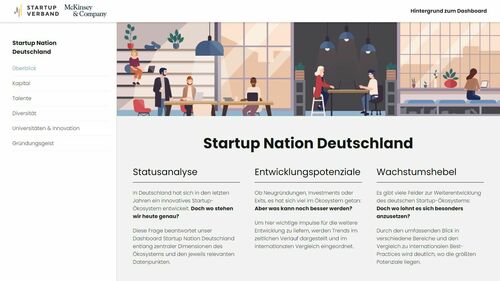A dashboard by the Startup Association and its research partner McKinsey & Company provides an overview of the performance of the German startup ecosystem and identifies development potential.
With the project “Startup Nation Deutschland: Status Analysis. Development potential. Growth Levers.” an overview of the performance of the German startup ecosystem. The dashboard bundles central data on the status of the German startup ecosystem and ranks it in comparison to top international locations such as the USA. Through the clear preparation of the data, the potential of the German startup ecosystem should be better recognised and necessary development impulses set.
The “Startup Nation Germany” is measured by a variety of indicators, including the number of unicorns, the total volume of exits and the share of startup valuations in the gross domestic product. The data shows that an innovative startup ecosystem has developed in Germany in recent years. However, the comparison with nations such as the USA also reveals problems with regard to international competitiveness.
While Germany is doing well in terms of the absolute number of Unicorns, for example, we are clearly lagging behind in relation to the number of inhabitants. Germany is also unable to keep up with the top group in terms of the share of startup company valuation in GDP. Although the value of the German startup ecosystem has increased six-fold in recent years, it does not even account for five percent of GDP – in the US it is 16 percent.
The ability to attract capital is the most important success factor for young companies. In terms of venture capital invested per capita, Germany is behind locations such as France or the UK – the gap to the US is even greater. While VC investments in the USA are five times as high, Germany also lags behind in a Franco-German comparison.
Another challenge is the German ecosystem’s heavy dependence on international investors. Only a quarter of the financing volume comes from domestic investors, a share that is so low in no other important European start-up location. In order to strengthen Germany’s innovative strength and competitiveness, this gap must be closed. In essence, it is a matter of mobilising the capital of private institutional venture capitalists, as this is the only way to meet the growing demand for venture capital in Germany.
Lina Behrens (Vice Chair Startup Association):
“A look at the data makes clear the great development potential of the German startup ecosystem. When it comes to growth and scaling, talent is the decisive factor, which is why the shortage of skilled workers is increasingly becoming a problem for startups – they rely on the most creative and best minds. To have a future as a location for innovation, we need not only faster and simplified immigration, but also internationally competitive regulations on employee participation. Otherwise, innovation will fail and viable business developments will take place elsewhere in the world.”
Max Flötotto (Senior Partner and Co-Leader of McKinsey’s European Fintech Practice):
“The future success of Germany’s startup ecosystem will have a decisive impact on the innovation and competitiveness of the entire country. If we want to pursue bold goals as a startup nation, we need a solid data base and progress analysis.”
Karel Dörner (serial founder and senior partner at McKinsey):
“To become a global leader, we need to be able to continuously compare ourselves with the leading startup ecosystems: Emphasise positive developments, but also identify gaps in potential and name necessary fields of action.
The dashboard “Startup Nation Germany: Status Analysis. Development Potential. Growth Levers.” is provided free of charge and can be accessed on this page: https://www.startupnation-deutschland.de/

